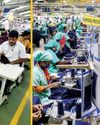
India has done well to increase its gross domestic product, to improve infrastructure or to develop a booming service sector since independence, but the real transformation has come in its flourishing agriculture that provides livelihood to three-fifths of its population. The devastating Bengal famine happened just four years before Independence laying bare the pitiable state of Indian agriculture.
And if analysts later claimed that it was largely a man-made famine, the fact remains that the country was suffering from a severe food shortage. Agriculture thus, was given prime importance with the beginning of the planning era and India has come a long way since then; from a food-deficit country it has become a food-surplus nation now.
India's foodgrains production rose more than six times in seven decades from 50.82 million tonnes in 1950-51 to 315.72 million tonnes in 2021-22. As per advanced estimates by the government, the total foodgrains production in 202223 would be a record 328 million tonnes, which is higher by nearly 30 million tonnes compared with the previous five years' (2017-18 to 2021-22) average production.
India is the world's second-largest producer of rice, wheat, sugarcane, groundnut, vegetables, fruit and cotton. India is also a leading producer of spices, fish, poultry, livestock and plantation crops. It is the world's largest producer of milk, pulses and jute.
The importance of agriculture was a testimony during Covid-19 days. While bumper stocks allowed the government to distribute foodgrains for free or at subsidised prices to distressed millions, higher farm sector growth helped the economy from falling down further. The World Bank in its 'Global Economic Prospect' report recognised the role of the farm sector in India and said that it was the only sector that displayed growth resilience as it had largely remained unscathed during the lockdown.
この記事は BUSINESS ECONOMICS の February 1 - 28, 2023 版に掲載されています。
7 日間の Magzter GOLD 無料トライアルを開始して、何千もの厳選されたプレミアム ストーリー、9,000 以上の雑誌や新聞にアクセスしてください。
すでに購読者です ? サインイン
この記事は BUSINESS ECONOMICS の February 1 - 28, 2023 版に掲載されています。
7 日間の Magzter GOLD 無料トライアルを開始して、何千もの厳選されたプレミアム ストーリー、9,000 以上の雑誌や新聞にアクセスしてください。
すでに購読者です? サインイン

Bank of Baroda, Kolkata Zone organised Mega Kisan Melas in West Bengal
Bank of Baroda (BOB) organised Mega Kisan Mela at Konkalitala in Birbhum District of West Bengal on November 18, 2024 as a part of the 7th Edition of the Baroda Kisan Pakhwada (BKP).

Time-Bound Disposal of Cases to Expedite the Delivery of Justice and affordabe by all in India
The delay in the disposal of cases in Indian courts remains a significant hurdle to the nation's progress.

Dev Deepawali: A grand celebration of light, spirituality, and culture in Varanasi
The holy city of Varanasi, often regarded as India's spiritual and cultural heart, came alive with the splendor of Dev Deepawali on the sacred day of Kartik Purnima.

The life of Job 'Ye judge not the judgment of God' - Jesus Christ
The Holy Bible reveals through the life of Job how the Lord tests the righteous and that faith helps one to overcome life's adversities.

India has the highest potential for the garment industry, only a conducive government policy is required.
India's textile industry is poised for remarkable growth, with expectations to double its contribution to the GDP within the next six to seven years.

Global Public Debt may be worse than it appears, warns IMF
Global Public Debt Set to Exceed $100 Trillion, Warns IMF

The economic consequences of Trump's Presidency: A global perspective
One of the key economic factors contributing to the Democrats' loss in the US elections was the significant rise in inflation, which was initially triggered by the COVID-19 pandemic and exacerbated by the Russia-Ukraine war.

Challenges and Successes in West Bengal's Education Sector: A Comprehensive Overview
The education system in West Bengal, particularly in districts, villages, slums, and government institutions, reflects a blend of progress and ongoing challenges.

What India can expect from Trump's return
I may be too early to predict how Donald Trump's second term as president will impact the global oil market.

Stocks Surge Following Donald Trump's Election as 47th President of the USA
Stocks soared following the election of Donald Trump as the 47th President of the United States. Investors anticipated that the Information Technology (IT) sector would benefit from lower corporate taxes under the Republican regime, with IT stocks leading the rally.